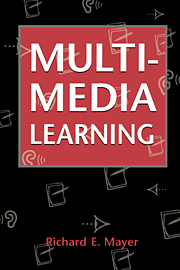Book contents
- Frontmatter
- Contents
- PREFACE
- 1 The Promise of Multimedia Learning
- 2 Multimedia Instructional Messages
- 3 A Cognitive Theory of Multimedia Learning
- 4 Multimedia Principle
- 5 Spatial Contiguity Principle
- 6 Temporal Contiguity Principle
- 7 Coherence Principle
- 8 Modality Principle
- 9 Redundancy Principle
- 10 Individual Differences Principle
- 11 Principles of Multimedia Design
- REFERENCES
- AUTHOR INDEX
- SUBJECT INDEX
4 - Multimedia Principle
- Frontmatter
- Contents
- PREFACE
- 1 The Promise of Multimedia Learning
- 2 Multimedia Instructional Messages
- 3 A Cognitive Theory of Multimedia Learning
- 4 Multimedia Principle
- 5 Spatial Contiguity Principle
- 6 Temporal Contiguity Principle
- 7 Coherence Principle
- 8 Modality Principle
- 9 Redundancy Principle
- 10 Individual Differences Principle
- 11 Principles of Multimedia Design
- REFERENCES
- AUTHOR INDEX
- SUBJECT INDEX
Summary
Multimedia Principle: Students learn better from words and pictures than from words alone.
Theoretical Rationale: When words and pictures are both presented, students have an opportunity to construct verbal and pictorial mental models and to build connections between them. When words alone are presented, students have an opportunity to build a verbal mental model but are less likely to build a pictorial mental model and make connections between the verbal and pictorial mental models.
Empirical Rationale: In six of nine tests, learners who received text and illustrations or narration and animation performed better on retention tests than did learners who received text alone or narration alone. In nine of nine tests, learners who received text and illustrations or narration and animation performed better on transfer tests than did learners who received text alone or narration alone.
INTRODUCTION
Does Multimedia Work?
The first question to ask concerns whether multimedia works: Do students learn better when a lesson is presented in two or more formats than when it is presented in one? In this book, I focus on a straightforward version of this question: Do students learn better when a lesson is presented in words and pictures than when it is presented solely in words? In short, does adding pictures to a verbal lesson help students learn better?
To answer this question, it is useful to define what is meant by lesson, words, pictures, and learn better.
- Type
- Chapter
- Information
- Multimedia Learning , pp. 63 - 80Publisher: Cambridge University PressPrint publication year: 2001



